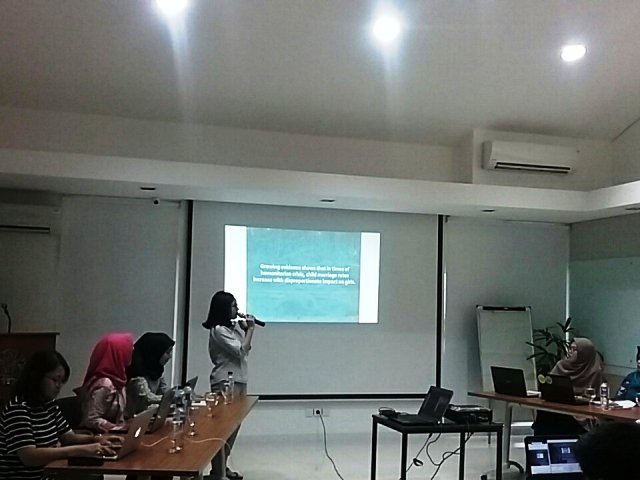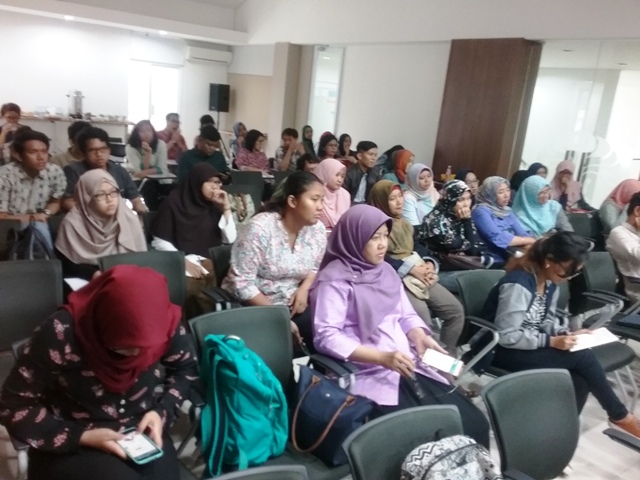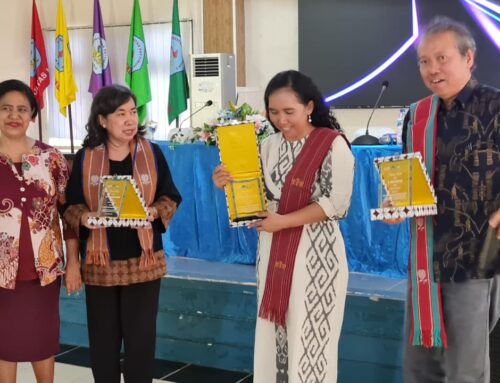On Tuesday 22 August 2017, a FKP seminar was held at LPEM FEBUI where graduating FEB UI students Adinda Rizky Herdianti, Luh Putu Ratih Kumala, Ina Erdawita, Bertha Fania Maula, Sri Puji Lestari, and Olga Stephiana presented their undergraduate theses. The common theme across their research is relationship and family life decisions. More than 80 people attended the presentation.
The first presenter was Adinda Rizky Herdianti and the title of her undergraduate thesis paper was “Parental Matchmaking and Intergenerational Transfers: The Case of Indonesia”. This topic was chosen as Indonesia is yet to have an adequate social security system in place for the elderly while Indonesia is posed to face an aging population. Usually, in place of inadequate social security system, the elderly rely on their children. This child-to-parent transfers are dependent on the lifestyle of the child especially whether the child is married or not. Hence parents usually feel the need to control who their child will marry to secure child-to-parent transfer which the parents will need when they grow old which was already researched in China. The question is whether child-to-parents transfer in Indonesia is influenced by parental matchmaking or not? In conclusion, high parental dependency towards their children will restrain wealth accumulation of the children to support themselves in the future while the excess of inefficient financing arises when the large number of working-age population ages, given the fact that fewer young population will replace and support them in exchange. Therefore wider social security coverage for the elderly and the proliferation of pension fund for current working age population should be the top priority for the government.
The second presenter, Luh Putu Ratih Kumala, presented her paper entitled “Too Young to Marry: Child Marriage as A Coping Strategy of Natural Disasters”. Which further research into growing evidence that in times of humanitarian crisis child marriage increase with disproportionate impact on girls. Various sources shows that parents and families turn to child marriage as a means of alleviating economic burden of the girl and to also protect the girl from insecurity that rises during emergencies. Interestingly, in Indonesia parents do it by sacrificing non-food goods which includes expenditures on the child and by doing child marriage the parents will cut down on the child education expense plus the household size will be reduced. Similar cases have also been observed by other researchers. Therefore, as now it has been shown that child marriage is a coping strategy of natural disasters and that there is close linkage between child marriage and poverty, the role of education facilities and infrastructure is immense in reducing child marriage. Thus government need to improve natural disasters preparedness, do more interventions during humanitarian crises, and also invest more on educational facilities and infrastructure.
The third speaker was Bertha Fania Maula who presented her paper entitled “Shattered Future: Does Having Children Early Disadvantage Women in Their Later-life Soft Skill Development?” This is an important topic as teenage childbearing affect human capital development negatively and Indonesia is 7th in the world in terms of rate of teenage childbearing. In the long run, teenage mothers are more likely to have lower education, lower socioeconomic status, lower earnings, experience family instability, and be more. They are also less likely to complete school and to participate in the labor force. Plenty of research have been done on this topic in regards to hard skills but in recent times soft skills have growing roles in the labor market. The research was done by taking 1050 samples, 140 teenage mothers and 911 non teenage mothers, from Indonesia Family Life Survey Wave 5. From the data it is found that teenage mothers, on average, have lower soft skills compared to non-teenage mothers, but it is not statistically significant. However, teenage childbearing is significantly and negatively associated with women’s openness to experience. Openness to experience is a characteristic which is increasingly demanded in the labor market thus teenage mothers could be at a disadvantage in the future labor market and in turn affecting the long-term economic well-being of the teenage mothers.
The next speaker was Ina Erdawita who presented her paper on “Breastfeeding and Children’s Cognitive Score in Indonesia: The Role of Mother’s Socioeconomic Status”. It has been widely spread how breastfeeding can provide many benefits which include a children higher cognitive abilities. However, many researches came up with conflicting results but it is noted that maternal and socioeconomic factors may have a greater role in children’s cognitive abilities than breastfeeding. The research is conducted with those factors accounted for also with 2456 individual data taken from Indonesia Family Life Survey 2000, 2007, and 2014. It is found that the effect breastfeeding have towards children’s cognitive score become stronger after controlled by socioeconomic status. In addition, the longer the duration of breastfeeding the more it increases the probability of children having cognitive score above average. Furthermore, children characteristic at birth does not significantly affect the children’s probability to have an above average cognitive score. On the other hand, the better the mother’s socioeconomic status the higher the probability of children having cognitive score above average. In conclusion, children who are breastfed are more likely to have cognitive score above average than those who were not breastfed and socioeconomic factors are significant predictors also strengthened the effect of exposure to any amount of breastfeeding to children’s cognitive outcome.
Afterwards, Sri Puji Lestari presented her paper entitled “Keputusan Bekerja Perempuan Menikah Dalam Keluarga Sandwich Generation”. Sandwich generation itself in short is when a three generation family, grandparents, parents, and children, live together under one roof. This is of importance as Indonesia is heading towards an ageing population and slowly the dependency rate towards the younger generation will be heavier. Furthermore, the data from BPS in 2014 shows that in Indonesia a sandwich generation is relatively common. Moreover, on one side previous research have shown that 75% of the care given to the elderly are done by women but women is also an important economical source which can be seen with as many as 50% of the women in Indonesia actually participated in the labor market. Previous researches on this topic in Indonesia mainly focused on the wellbeing of the women and the caregiving for the children while this research attempted to find out how sandwich generation affect married women’s decision on the labor market. Using the data from Indonesia Family Life Survey 2014, it is found that women in sandwich generation tend to not participate in the labor force. From this research it is apparent that sandwich generation have negative effect and that the appearance of grandparents actually have a positive effect. In other words if there is a negative effect from sandwich generation it is not because of the grandparents rather it is because of the children.
Lastly, Olga Stephiana presented her paper, “Peran Ibu Bagi Perkembangan Anak: Pengaruh Ibu Bekerja Terhadap Perkembangan Kognitif”. The role of a mother as the care-taker in the household is still apparent in society where the existence of mother in a household is a form of investment for the future of the children. On the other hand, as stated by the previous speaker, the participation rate of women in the labor force is pretty significant and for the mothers who work it potentially means they have less time to spend taking care of their children and this might affect the cognitive growth of the children. However, taking into account the various factors that affect the cognitive growth in a child, do mother’s participation on the labor market really affect it?
This research is conducted using the data from Indonesia Family Life Survey wave 4 and wave 5, where 1061 children whom mothers work at least once a week, on leave, or are actively looking for a job, are taken as the samples. It is found that for children in the age 0 to 3 years, working hours of the mom potentially affect the children cognitive growth negatively, but it is small compared to other factors such as the age of the children and the parent’s educational background. In conclusion, mothers participation in the labor force have the potential to reduce the cognitive score of the children but it is minuscule when compared to the positive effect from other variables like child participation at school. Accumulated, as the children grow older, the additional work hours of the mother potentially improve the cognitive score of the children. Hence, it can be said that even if early on mothers participation in the labor force may have negative effect to the cognitive score of the children, it can be compensated by other more significant factors such as breastfeeding and formal education.


![[FKP hosted by Universitas Padjadjaran] Kesehatan ibu pasca melahirkan di Indonesia](https://www.fkpindonesia.org/wp-content/uploads/2024/02/fkp-2024-02-21-thumbnail-500x383.jpg)

![[FKP hosted by ANU Indonesia Project] The pursuit of food self-sufficiency in Indonesia: food-trade policy preferences during the administrations of Yudhoyono (2004-2014) and Widodo (2014-present)](https://www.fkpindonesia.org/wp-content/uploads/2024/01/fkp-2024-01-16-500x383.jpg)
![[FKP hosted by ANU Indonesia Project & SMERU] Prepayment, price, and welfare: a study on electricity demand in Indonesia](https://www.fkpindonesia.org/wp-content/uploads/2023/02/fkp-2024-01-19-thumbnail-summary-500x383.png)
